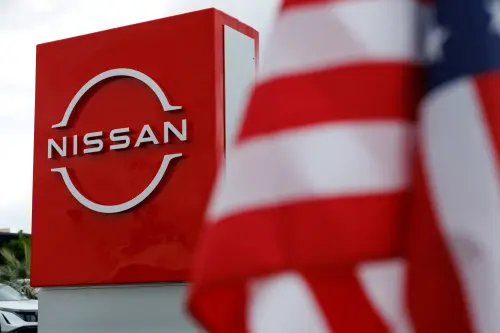Introduction
Japanese automakers have enjoyed significant success in the U.S. market due to the appeal of their economy cars and low-cost production in Mexico. However, the recent decision by U.S. President Donald Trump to impose 25% tariffs on auto imports threatens to disrupt this business model.Context
The tariffs are set to take effect on April 3, and while the long-term implications remain uncertain, industry experts believe that companies like Nissan and Honda may be compelled to increase prices, impacting their most price-sensitive buyers. This is particularly concerning for Nissan, which heavily relies on its presence in the U.S. and production facilities in Mexico.Developments
In the previous year, Japanese car manufacturers exported nearly 880,000 vehicles to the U.S. from Mexico, with Nissan leading the way, sending over 327,000 cars across the border. The Sentra, Nissan's most exported model, had 180,000 units shipped, starting at a price of $21,590.- Goldman Sachs predicts that the tariff-induced price increases could result in decreased sales and profitability for Japanese automakers in the current financial year.
- Nissan is expected to face the second-largest profit reduction at 56%, following Mazda with a projected 59% decline. Toyota and Honda are anticipated to see declines of 6% and 8%, respectively.
- Nissan has struggled with an aging lineup and limited hybrid options, causing it to cut its profit forecasts multiple times in the past year.
Nissan's new CEO, Ivan Espinosa, aims to expedite the development of new vehicles. Slow decision-making previously stalled merger talks with Honda. Meanwhile, Toyota has indicated it will maintain current pricing and operations for now, and Honda is contemplating restructuring its production network in response to the tariffs.
Production Responses
To mitigate potential tariff impacts, Honda is planning to manufacture its next-generation Civic hybrid in Indiana instead of Mexico. James Hong from Macquarie estimates that the tariffs, if passed onto consumers, could result in price hikes of around 20%, causing price sensitivity among buyers.With approximately 27% of Nissan's U.S. sales sourced from Mexico compared to 13% for Honda and 8% for Toyota, shifting production from Mexico is challenging due to limited capacity in U.S. facilities. As a result, many consumers may opt for used cars, potentially driving up prices in that market.
